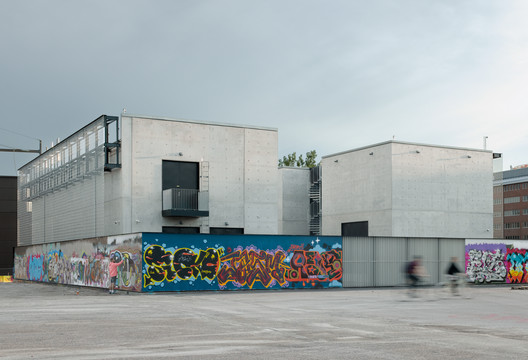
-
Architects: Kivinen Rusanen Architects
- Area: 898 m²
- Year: 2019
-
Photographs:Max Plunger
-
Lead Architects: Tuomas Kivinen

Text description provided by the architects. The Kalasatama Electricity Substation serves the rapidly developing Kalasatama area situated close to downtown Helsinki. It consists of two buildings housing transformers and a switchgear building, all in in-situ white concrete and clad over by an aluminum graffiti fence and an architectural steel mesh. The location is a central, urban site between the former Suvilahti power station that has been transformed into a cultural center and the still-functional Hanasaari power station. The site is located by one of the main traffic arteries leading to the city center.































